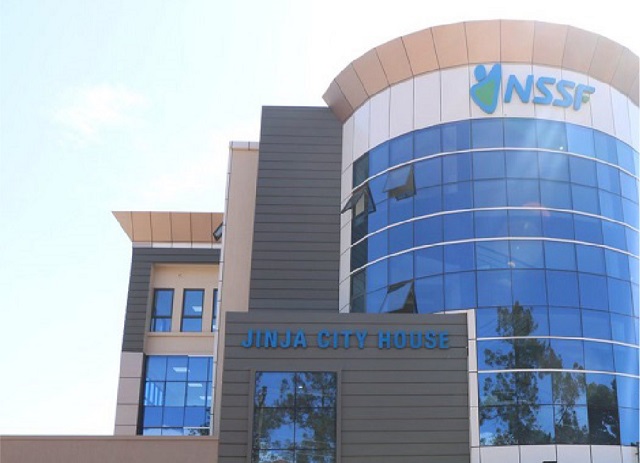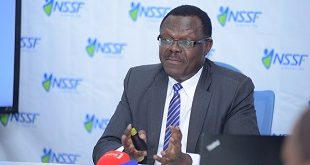
The pandemic has eroded return on contributor’s savings
Kampala, Uganda | JULIUS BUSINGE | Uganda’s pension firm, National Social Security Fund, will pay low interest rates on contributor’s savings due to the impact of coronavirus pandemic.
NSSF Managing Director, Richard Byarugaba, flanked by his deputy, Patrick Ayota, said on Sep.24 during a virtual press briefing that the economic downturn in Uganda and the East African region as a result of the pandemic fallout, hurt the Fund’s operations in the last two quarters of Financial Year 2019/2020.
Available data indicates that the country’s economy contracted by 3.2% in the second quarter of 2020 and economic growth projections dropped to around 3% compared to 5.2% in the previous Financial Year.
The Fund’s stock market gains in the first two quarters of the year were wiped out by the end of the year as a result of stock’s underperformance in all markets apart from Tanzania.
The Fund was also affected by the Uganda currency movement in relation to other major currencies; and the directive by the Central Bank to hold back dividend payments by commercial banks.
“Given the operating environment we faced, we may not be in position to pay a double-digit interest rate on members’ savings for the Financial Year 2019/2020,” Byarugaba said.
The Minister of Finance, Planning and Economic Development Matia Kasaija would on Monday, Sept. 28 declare the annual interest rate at the Fund’s virtual Annual Members Meeting in in line with Section 35 (2) of the NSSF Act.
In FY2018/2019, the Fund paid 11% interest rate, and 15% the previous year. The Fund last paid a single-digit interest rate nine years ago, FY2010/2011.
But Byarugaba said whatever rate the Minister declares, it would be very competitive, above the 10 year average rate of inflation.
“We will also keep the promise made to our members when we launched our 10-year Strategic Plan; which is to pay at least the 10-year average rate of inflation plus 2 percentage points.”
The 10 year average rate of inflation is 6.2%, meaning the least the members would get is 8.2%.
Byarugaba said the Fund remains very resilient given that the assets under management continued to grow at a time most businesses were struggling to survive the negative implications of COVID-19.
Byarugaba said the Fund’s upward trajectory towards achieving at the asset base of Shs20trillion by 2025 is not in doubt,” he added.
The Fund’s investment portfolio mix was targeted at 75% for fixed income, 5% for real estate and 25% for equities. But the end of financial year show the Fund investing members contributions as 77.2% in fixed income, 7.7% in real estate and 15% in equities.
Byarugaba said this investment decision ensured that the Fund managed risks that would result into loss of members’ savings.
Meanwhile, Byarugaba said that works on all the projects that the Fund is investing in never stopped because of coronavirus pandemic.
NSSF amendment bill before parliament
Going forward, on the investment side, Byarugaba said the government, through the NSSF Amendment Bill that is before Parliament, should allow the Fund to invest beyond East Africa as one way of improving returns for members in years to come.
“Stock markets in the US and Europe have been booming even amidst COVID-19,” he said.
On the collection side, Byarugaba said the government should use the same bill to bring onboard more informal non-contributors to the NSSF bracket and also allow current members to save beyond the mandatory amounts/percentages that are stated in the NSSF Act.
He also asked government to give the NSSF more powers to deal with defaulting employers. The Fund has a total of 2.5million members but only 800, 000 are active.
Meanwhile, a total of 2, 000 companies asked for amnesty because of COVID-19 pandemic and that resulted into Shs22bn not being remitted to the Fund during the lockdown months.
Performance in Summary
- Assets under Management increased by 17% from Shs11.3 trillion to Shs13.38trillion as at June 30, 2020, mainly driven by increased contributions and interest income
- Total revenue increased by 17% from Shs1.25trillion in 2018/19 to Shs1.47trillion as at June 30, 2020, driven by growth in interest income as a result of exposure to high yielding fixed income investments and rental income.
- Member contributions increased by only 5% from Shs1.22 trillion to Shs1.28trillion. The marginal growth is attributed to the amnesty the Fund offered to business that were affected by COVID-19 pandemic. The Fund deferred a total of about Shs22 billion.
- The money paid in benefits to qualifying members increased by 8% from Shs450billion in 2018/2019 to Shs486 billion in 2019/20. The marginal growth is due to COVID-19 pandemic and subsequent lockdown which forced a significant number of members to defer their claims.
- Cost of administration improved from 1.28% in 2018/2019 to 1.20% in 2019/2020, while the cost to income ratio also improved by 7% from 13.02% to 12%.
****
 The Independent Uganda: You get the Truth we Pay the Price
The Independent Uganda: You get the Truth we Pay the Price



